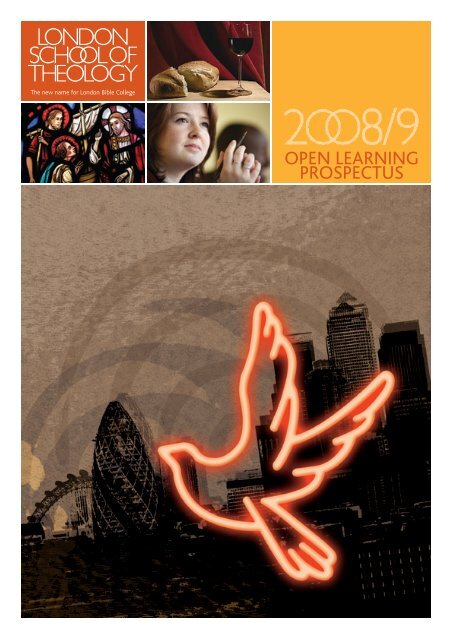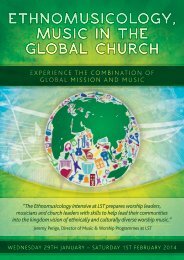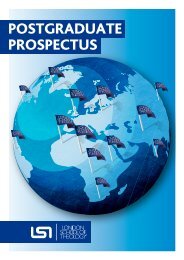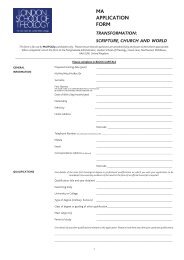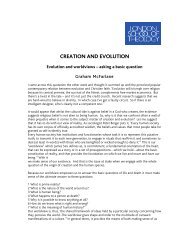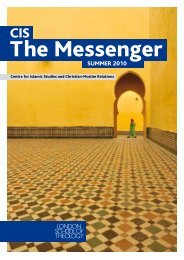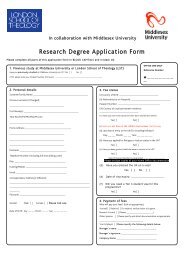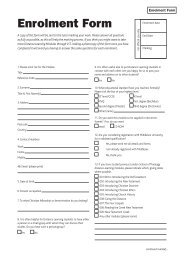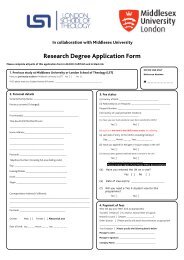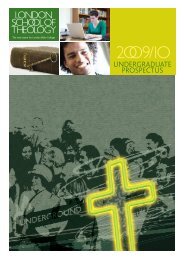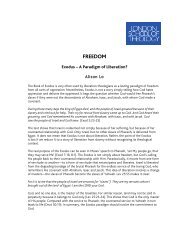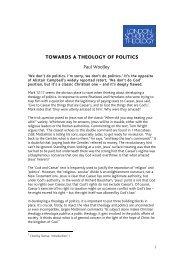Distance Learning Prospectus 2009.pdf - London School of Theology
Distance Learning Prospectus 2009.pdf - London School of Theology
Distance Learning Prospectus 2009.pdf - London School of Theology
Create successful ePaper yourself
Turn your PDF publications into a flip-book with our unique Google optimized e-Paper software.
Who We AreOpen <strong>Learning</strong> at <strong>London</strong> <strong>School</strong> <strong>of</strong> <strong>Theology</strong>Open learning is the umbrella term we use for all <strong>of</strong> our occasional and non-residentialstudy. You may be more familiar with terms such as ‘distance learning’, ‘extensionstudies’, ‘evening classes’ or ‘study by correspondence’. They refer to the same thing:a range <strong>of</strong> study materials and events for people unable to attend onsite for full- orpart-time study.By choosing Open <strong>Learning</strong>, you tap into a high quality education. This is a wellestablishedmethod <strong>of</strong> study with unique strengths. The experience <strong>of</strong> the OpenUniversity over the past decades has demonstrated that distance learners can readilyand easily achieve high levels <strong>of</strong> competence. You can have confidence that thestudy material provided to you will be <strong>of</strong> the highest possible standard: academically,pastorally and spiritually.There are over 30 modules for you to choose from, and over the next few pages you’llfind out more about them and how best to fulfil your goal.History<strong>London</strong> <strong>School</strong> <strong>of</strong> <strong>Theology</strong> started in 1943 (as <strong>London</strong> Bible College) <strong>of</strong>fering onlyevening classes. Before there were residential students, there was Open <strong>Learning</strong>.It was another three years before the first small group <strong>of</strong> full-time students werewelcomed, and from these beginnings an institution <strong>of</strong> international reputationdeveloped. The Open <strong>Learning</strong> Department now has over 1000 students from allover the world.Mission StatementLST’s aim is to equip studentsto express the message andlove <strong>of</strong> Jesus.Who is LST for? Committedevangelical Christians fromvarious church backgroundsand <strong>of</strong> various ages.How will we equip students?By developing biblical andtheological thinking to highlevels, nurturing spiritual giftsand skills, and encouragingpersonal spiritual growth.How will we do this? Throughacademic discipline, practicaltraining, worship, communitylife, pastoral care throughChristian discipleship, service,scholarship, writing, speakingand personal example.I chose to study at LST because <strong>of</strong> its good reputation for biblical studies andbecause <strong>of</strong> the possibility <strong>of</strong> studying on an open learning programme. I was livingin Cambridge, and had access to good libraries, so the idea <strong>of</strong> distance learningappealed to me. It meant that I could continue to work part-time to support myself,and study the rest <strong>of</strong> the time.I really enjoyed and benefited from the Certificate in <strong>Theology</strong> with LST. Myknowledge and understanding <strong>of</strong> the Bible has greatly increased. It has also beenhelpful to be <strong>of</strong>fered new ways <strong>of</strong> approaching the Bible, for example by looking atthe main narrative <strong>of</strong> the Bible, from creation, through to fall, redemption and newcreation in order to form a biblical worldview.Laura BeathamLST 3
FAQsWould you like todevelop your personalknowledge <strong>of</strong> the Bible,theology and spirituality?Are you looking for arecognized qualification,but can’t study on siteat LST? Then <strong>Distance</strong><strong>Learning</strong> is for you. Youcan choose the type <strong>of</strong>learning and qualificationthat suits your short- orlong-term needs.LST 4When can I start?Choose your own start date. We donot operate on an academic yearprogramme, so you can start your studywhenever suits you.How much time will I have to study?Choose your own work rate. Study a fewhours every week, or study whenever theopportunity arises. Choose to buy oneyear or three years <strong>of</strong> tutor contact time,depending on your anticipated work rate.Can I choose which modules to study?Yes. If you’re studying for your owndevelopment and interest, you canstudy whatever modules you wish. Evenon accredited courses with a number<strong>of</strong> compulsory modules, there is stillsignificant flexibility to choose themodules that interest you.What are credits?All our modules are valued in numericalterms called ‘credits’. Each creditrepresents 10 hours <strong>of</strong> study time. So a20 credit module requires 200 hours <strong>of</strong>study; a 10 credit module requires 100hours. This time includes study <strong>of</strong> themodule workbook, reading textbooks andpreparing work for assessment.What kind <strong>of</strong> qualification will I get?That’s up to you. We <strong>of</strong>fer a full degreeprogramme, with exit qualificationsat Certificate and Diploma level, allvalidated by Middlesex University. Wealso <strong>of</strong>fer internal LST awards.But what if I don’t want anotherqualification?You can also choose not to studytowards a qualification at all.Do I have to come to LST?Choose to come to LST to take part inoccasional study weekends or Saturdayclasses as an extra element <strong>of</strong> yourstudy. Meeting other students can bea rewarding experience, whilst learningwith our faculty and invited speakersprovides renewed impetus to continuewith the home study. But you can alsochoose never to come to Northwoodat all! The entire programme can becompleted from anywhere in the worldwithout you ever needing to visit us.What if I decide that I want to comeand study at LST?You can start with <strong>Distance</strong> <strong>Learning</strong> andthen switch into full- or part-time study (orvice versa). The study you have completedto that point can be taken into account.How will I be assessed?All assessment is done through essays andprojects – there are no exams.What is the study material like?Study material comes to you in speciallywritten books, textbooks and videos. Anever increasing number <strong>of</strong> modules areavailable as computer files rather thanworkbooks. Instead <strong>of</strong> the paper book, (or inaddition to, if you want) we can send youthe study material on a CD-ROM, or emailyou the files. There is a discount for this.How much extra reading will I have to do?If you are studying for a validatedqualification, you will have set texts toread. Otherwise, it is up to you, althoughyou will be expected to do backgroundreading in addition to the study materialwe provide. The study material takes theplace <strong>of</strong> face-to-face lectures, but doesnot replace textbooks. We will provideyou with extensive reading lists fromwhich you can pick suitable items to read.In addition, our Bookshop <strong>of</strong>fers a range<strong>of</strong> relevant books that you can buy at adiscount if you buy three or more titles.Please contact us, or consult our website,for more details and current costs.Can I use the LST library?As a distance learning student you areentitled to come and use the library during <strong>of</strong>fice hours, though we cannot <strong>of</strong>fer borrowing rights.Will I get any support or help?For each module <strong>of</strong> study you will beassigned a tutor to help you with yourstudy. (In some countries, this personwould be better described as a mentor oreven a pr<strong>of</strong>essor.) They are all specialists inthe academic subject, and experienced inhelping people with the distinctive nuances<strong>of</strong> <strong>Distance</strong> <strong>Learning</strong>. They can help clarifythings if anything in the study materials isunclear, and help you with any faith-basedchallenges you may encounter. They alsograde your written assessments.
Areas <strong>of</strong> Studyand ModulesOld TestamentIntroducing the Old TestamentBasic Old Testament <strong>Theology</strong>JeremiahGenesisNew TestamentIntroducing the New TestamentFour Gospels1 Corinthians<strong>Theology</strong> <strong>of</strong> PaulBiblical InterpretationBible and WorldScripture and HermeneuticsApplied <strong>Theology</strong>Introducing Christian EthicsMission and Cross-Cultural StudiesLiberating the LeadershipChristian Life & WorkChristian Life & Today’s WorldChristian SpiritualityDoctrinal and HistoricalStudiesIntroducing Christian DoctrineThe Future Hope: Biblical EschatologyIntroducing Church HistoryHistory and Theory <strong>of</strong> Christian MissionReligious StudiesReligion and ReligionsIslamCarey Course in Christian Muslim RelationsBiblical LanguagesReading the Greek New TestamentNew Testament GreekColossians and Philemon: Greek ExegesisBiblical HebrewStudy SkillsGoing the <strong>Distance</strong>Although I had been going to church since I was a child, it was only a few yearsago that I started to understand key Christian doctrines. I decided to study theBible and the basics <strong>of</strong> theology, but I was at a loss as to where to start. I neededsome guidance in my study. Because <strong>of</strong> my job, it was impossible to study fullorpart-time at any Bible college. Therefore I looked for a correspondence coursein theology, but I could not find any in Japanese institutions. So I turned myattention abroad, then I came across the LST website. After reading every page<strong>of</strong> the prospectus <strong>of</strong> their Open <strong>Learning</strong> <strong>Prospectus</strong>, I decided to apply for it.LST’s course provided a wide range <strong>of</strong> programmes, and it granted students upto three years to complete one module.Three years have passed since I started the course, and I am totally satisfiedwith how things have gone. Tutors are supportive as well as erudite. Two yearsago, I made my first trip to the UK and visited the LST campus, meeting up withtwo <strong>of</strong> my tutors. It was one <strong>of</strong> the best memories <strong>of</strong> my life.I would like to study theology full time in the future, and I believe theexperiences and the academic training I gained through this Open <strong>Learning</strong> hasbeen the best preparation for that.Norio YamaguchiLST 5
Study for PersonalDevelopmentdiscussions. It focuses on the way webuild up a system for dealing with suchquestions, so that as new issues arise weare better equipped to respond to them.This subject is <strong>of</strong> vital importance to allChristians.Introducing Church History (005)Credits: 20The Church has a heritage that is rich,diverse and colourful. You make think<strong>of</strong> history as a boring subject, simply alist <strong>of</strong> dates and events. However thesituation in which we live now is stronglyaffected by the past. An improvedawareness <strong>of</strong> those events will help usunderstand the impact they have on us,and be far more relevant and useful thanabstract facts. It will enable us to applylessons from the past, and potentiallyavoid repeating some <strong>of</strong> the mistakes.Our approach looks beyond the historicaldates and facts and focuses on the effectsthese events have had.Was Constantine a ‘good thing’ tohave happened to the church? Whywere Christians in the past so keen onmonks and monasteries? Would theReformation still happen had MartinLuther never been born? Where didyour denomination come from? Do theevents <strong>of</strong> the past shackle our presentdevelopment? Were the Church Councils<strong>of</strong> the third and fourth centuries toodominated by politics to be <strong>of</strong> anytheological validity?This module will enable you to gainan overall grasp <strong>of</strong> the history <strong>of</strong> theChristian Church from its beginningto the present. Investigating how theChurch confronted the challenges <strong>of</strong> thepast, you will be better able to apply thatthinking and insight to contemporaryproblems and situations.Going the <strong>Distance</strong> (008) Credits: 10Trying to study by distance demandsnew skills and abilities, ones that few <strong>of</strong>us were taught at school. This moduleis specifically designed to help youimprove those skills and so gain morefrom the other modules. Amongst otherthings, it will teach you how to readtextbooks more effectively, how to writebetter essays and how to maintain yourenthusiasm for study. It also addressesthe difficult issue <strong>of</strong> coping withchallenges to our faith and belief thatmight arise from studying academictheology.The core <strong>of</strong> this module is the book The<strong>Distance</strong> Learner, written and producedby St. John’s College, Nottingham; weare grateful to them for permission touse their material in this way. There is asingle assessment, involving the analysis<strong>of</strong> a Grove Booklet.Christian Life & Today’s World (441)Credits: 10We tend to take the world around usfor granted. Like fish in the water, weare barely even aware <strong>of</strong> the way thatour culture impacts and affects us.Furthermore, life in our contemporaryWestern culture seems to move atan increasingly hectic pace. We find itdifficult not to be conformed to ourculture, let alone act effectively totransform it.How can I recognise the way the world’sculture influence me? Should Christiansengage with the modern world, or shouldwe campaign for the preservation <strong>of</strong>traditional values and methods? How doI go about buying and spending withoutbeing affected by the consumerist values<strong>of</strong> advertising?CL& Today’s World is designed to helpyou identify the cultural influences—obvious and subtle—that affect us, tounderstand the relationship betweenfaith and contemporary culture, and howto engage with the culture in ways thatmove beyond the superficial to create realtransformation.A copy <strong>of</strong> the companion book ChristianLife and Today’s World (SU, 2002) issupplied with the study material.Christian Life & Work (440) Credits: 10On average people spend 70% <strong>of</strong> theirwaking hours working each week. For somethis may be in a Christian environment,but <strong>of</strong> the vast majority it will be in thesecular workplace or in the home. Thismodule is designed to help you and yourChristian community to understand thatall work is important to God and needsrelevant teaching.Is the feeling <strong>of</strong> drudgery and fruitlessnesswe feel about work part <strong>of</strong> the curse inGenesis 3? Is work something we haveto do and not actually <strong>of</strong> any interest toGod? Is the workplace a legitimate placefor evangelism? If so, how would we goabout it?You will investigate the theologicalaspects <strong>of</strong> work, considering ethical issuesdistinctive to the workplace - such asglobalisation or excessive work hours - orthe implications <strong>of</strong> unemployment andministry amongst work colleagues.Since becoming a Christian over ten years ago, my theological curiosity had beengrowing. It has also been a decade <strong>of</strong> feeling unsettled in my chosen career. For me, LST’sdistance learning courses have helped me to pursue burning questions and opened up thepossibility <strong>of</strong> a new vocation, without the need to move house and home! But the courseshave been more than just a solution to my intellectual desire and life situation. Thewell-written materials with their clear overviews <strong>of</strong> topics, feedback from tutors, selfreflectionactivities, and guidance for further reading, have helped me develop an abilityto ‘think theologically’. My studies have helped me handle Scripture more carefully andhave increased my capacity for understanding life issues in terms <strong>of</strong> biblical principles.Simon Howard, FinlandLST 8
Study forQualificationsLevel 1Compulsory modulesOptional modules group A(at least 2 from this group)Introducing the Old Testament Church History 1 Greek 1Optional modules group B(either 1 or 2 from this group)Introducing the New Testament Cross-Culture and Mission The World <strong>of</strong> WorkBible and World Christian Spirituality Faith and Thought in Today’s WorldChristian Doctrine SurveyEvangelicalismPersonal, Spiritual and Skills Formation 1Level 2Compulsory modulesOptional modules group A(at least 2 from this group)Religion and Religions<strong>Theology</strong> <strong>of</strong> WorshipOptional modules group B(between 2 and 4 from this group)Encountering God and Neighbour Church History 2 Biblical Texts: ExodusMinistry and Teaching <strong>of</strong> Jesus The Person and Work <strong>of</strong> Christ <strong>Theology</strong> <strong>of</strong> PaulScripture and Hermeneutics Sin and Grace Introduction to HebrewLife <strong>of</strong> the Church in ContextPersonal, Spiritual and Skills Formation 2 Greek 2Level 3Compulsory modulesThe Bible and the People <strong>of</strong> God: Then & Now<strong>Theology</strong> ProjectPersonal, Spiritual and Skills Formation 3Optional modules(between 3 and 6 from this list)Family in Biblical and ContemporaryPerspectivesIntermediate Hebrew AIntermediate Hebrew BGreek 3AGreek 3BThe Church in the WorldThe Modern ChurchSpirit, Personhood and ChurchFaith and ScienceMissiologyBeing the Church in the Contemporary WorldIslam in the Modern WorldFamily in Pastoral PerspectiveDirected StudiesReadings in Biblical HebrewEschatologyLeadershipPreachingEvangelismIslam SurveyLST 10Notes: There may be a number <strong>of</strong> minor changes to the list, especially concerning which modules are compulsory and which optional.Please contact us to confirm availability and suitability <strong>of</strong> the modules.
What qualification shouldI aim for?You may have a very clear idea <strong>of</strong> whichqualification you want to obtain, butyou do not have to make a final decisionuntil later in the process. Your firsttarget is to complete Level 1. In order tocomplete Level 1 you will take about eightdifferent modules, and do some practicaltraining. You will then have the option<strong>of</strong> leaving the programme with a CertHEqualification, or to continue.If you choose to continue, you repeat theprocess <strong>of</strong> studying another eight modulesand practical training. This then gives youanother opt-out point, where you wouldleave with a DipHE qualification.Finally, if you choose to continue studying,you’ll do the third and final level <strong>of</strong> study,and leave with a BA Honours Degree inTheological Studies.Can I change my mindlater, and come back todo the next level?Yes. If, for example, you leave witha CertHE, you can come back in at alater date to carry on to the next level.Whatever unforeseen circumstancesmight occur, you will be able to takestock <strong>of</strong> the progress you’ve made tothat point and either ‘cash in’ the workto gain a qualification, or take a formalleave <strong>of</strong> absence and return to study at alater date. The study you do will never bewasted.How long will it take?You will need to have about 10 hoursa week available for an average <strong>of</strong> 40weeks in the year; this will give you theright study rate <strong>of</strong> 400 hours a year. Thattarget allows plenty <strong>of</strong> time for time <strong>of</strong>ffor holidays, Easter and Christmas, andeven a week or two <strong>of</strong>f in case you getill! 10 hours a week is the equivalent<strong>of</strong> about two evenings a week and aSaturday morning, for example, for yourstudy. Other people, however, take aweek <strong>of</strong>f work and get 30, 40 or even 50hours study done in that one week. Somenegotiate a day <strong>of</strong>f a week from their job.On the basis <strong>of</strong> studying 400 hours a year,it will take 3 years to complete each level,i.e. 3 years to complete the CertHE, 6 yearsto complete the DipHE and 9 years tocomplete the BA Hons.<strong>Distance</strong> learning will involve some sort<strong>of</strong> sacrifice to meet the study time.We encourage you to think this overthoroughly before starting. But we alsoencourage you to be brave and give it atry. The best way <strong>of</strong> finding out if you canmanage it is to actually attempt it.Are there any entryrequirements?You must demonstrate the ability toundertake an undergraduate course <strong>of</strong> thisnature successfully. This will normally mean2 A-levels plus GCSE passes at grade C orabove for British students, or equivalentalternatives from elsewhere. Maturestudents (aged 23 and over) withoutthese qualifications will be consideredindividually. In almost all cases, we will beable to admit you to the course informallyat first, and then <strong>of</strong>ficially register you onceyou have demonstrated ability to completeat least 30 credits <strong>of</strong> work in an appropriatetime scale.We also recognise a variety <strong>of</strong> trainingcourses, such as those provided by Oasis,Pioneer and NFI, as having access status.We will be able to consider how any suchstudy might meet a portion <strong>of</strong> a level oreven an entire level and allow you creditfrom some modules. Contact us directly todiscuss your training and experience.Applicants whose first language is notEnglish will need to demonstrate ability inEnglish.What if I’ve already donesome theological training?If you have already done some study <strong>of</strong>theology, or a similar subject, in a differentinstitution in Great Britain or overseas youmay want to apply for ‘advanced standing’.This will allow you some exemption fromthe full 120 credits <strong>of</strong> a level. MiddlesexUniversity will only make final decisionsbased on paper work supplied from theinstitution you previously studied with,but we can give you an informal guideprior to that.Please note, you cannot leave with anexit award for a level for which youobtained part advance standing. Forexample, if you are exempt from part <strong>of</strong>the Certificate level, say 40 credits, youcould not be awarded a CertHE; you willhave to continue to the DipHE before youcan take an award. If you are exemptedthe entire CertHE level then the firstaward you could take would also be theDipHE.To apply for advance standing, pleasecontact us for formal details and aspecific application form. There is aseparate fee for this.Who validates myqualification?All qualifications are validated by theUniversity <strong>of</strong> Middlesex.Will I need extra books?There are compulsory texts for everymodule, so we would encourage youto budget between 30 and 50% extraat Certificate level, and at least 50% atDiploma level, per module for buyingbooks. This is not compulsory, butstrongly advisable. However, it is vitalthat you consider how to obtain thetextbooks you will need. Getting hold<strong>of</strong> the relevant books can be a particularchallenge for distance learning students.The LST Bookshop <strong>of</strong>fers discount packs<strong>of</strong> books targeting each module.LST 11
ApplicationsStudying for a Qualification1. Complete an application form, available from the Open <strong>Learning</strong> Department. (If youtalk to someone at the Reception Desk at LST or in Registry, please make it clear thatyou need a distance learning application pack, not a prospectus.)2. Return the medical certificate completed by your doctor, and the names <strong>of</strong> tworeferees. We will then take up those references, look at the study you have done s<strong>of</strong>ar (if any) and make an initial decision based on that information.3. Occasionally we need to discuss your application further before we can make a finaldecision. We may contact you by email or phone, or invite you to a formal interview.This may be either at LST or at a convenient location not far from your home.4. When we <strong>of</strong>fer you a place, we would like, if possible, for you to attend one <strong>of</strong> ourSaturday study days at LST. This is not for a formal interview, but will give you theopportunity to meet with members <strong>of</strong> the <strong>School</strong> staff, possibly including a distancelearning tutor, to have an informal discussion about your application, and to receivesome excellent teaching. We would also like you to meet with a representative <strong>of</strong> the<strong>School</strong> at a convenient location not far from your home, to chat informally over yourexperience thus far, and the future meetings for your locality. Initial proposals for yourpractical training will also be discussed at this point. We appreciate that for a verysmall number <strong>of</strong> students it will not be feasible to come to LST, or even to meet witha tutor. Once you have explained your situation, we will do everything possible toaccommodate your situation.Studying for Personal DevelopmentThe application process is straightforward as there are no entry criteria.1. Contact the Open <strong>Learning</strong> Department for an application form.2. Complete the application form by selecting the module you want to take.3. Send the form back to us, together with your payment. It normally takes us betweena week and ten days to process your order and send your study material.Study material by post or by emailWe can post paper copies to you, or send electronic copies <strong>of</strong> the study material if youprefer. By sending a CD or email with PDF files <strong>of</strong> the study material, we can send youstudy material much more quickly and efficiently. The price list provides information onthe costs for modules bought by these different methods.Contact with your TutorWhichever modules you choose to study, we guarantee that your tutor will be availableby phone or email. The word ‘tutor’ does not mean the same thing in all contexts. Yourstudies will involve interaction with a pr<strong>of</strong>essional person with extensive skill in thesubject who will guide your development and study. In the British context we typicallyrefer to such a person as a ‘tutor’ who <strong>of</strong>fers supervision. However, in some overseascontexts the better title to use for this person would be ‘mentor’.Submitting work for assessmentWe encourage you to submit work by email. This may entail a few experiments toensure compatibility <strong>of</strong> systems and programmes, but otherwise this is now ourpreferred method <strong>of</strong> submission for overseas students. Your work will also be returnedby email. If you prefer to submit work on paper by post without an electronic copy thenyou will need to pay further airmail costs to cover return <strong>of</strong> your study material. Essaysare normally surprisingly bulky, so postage costs may be expensive.English language abilityIf English is not your first language and you want to study for an accredited qualification,you will need to demonstrate sufficient English language ability.LST 13
HOW TO FIND USBy RoadFrom <strong>London</strong>, take the A40 to the Ruislip exit. Travel northon the A4180, through Ruislip, bearing left at the miniroundaboutafter the Ruislip shops. Continue on the A4180until it ends in a T-Junction with the A404 at traffic lights.Turn right onto the A404 and then left at the next trafficlights into Green Lane. The entrance to LST is on the left,about 200 yards along Green Lane.From the M25, exit at Junction 18. Take the A404 towardsRickmansworth. Continue on the A404, following signs forNorthwood, past Mt. Vernon Hospital. Continue until thesecond set <strong>of</strong> traffic lights and turn left into Green Lane.The LST entrance is on the left, about 200 yards alongGreen Lane.By UndergroundNorthwood underground station is on the Watford branch<strong>of</strong> the Metropolitan Line. The journey from Baker Streettube station takes about 30 minutes. The journey fromWatford tube station takes about 15 minutes. LST is fiveminutes walk from Northwood station. Turn left out <strong>of</strong> thestation onto Green Lane – we are about 200 yards after thelast <strong>of</strong> the shops, on the right hand side.By RailWatford Junction station is on the West Coast main line andlocal railway line from <strong>London</strong> Euston. It is also on a branchline to St Albans. Trains also run to Brighton and GatwickAirport via the West Coast line and the West <strong>London</strong> Linethrough Kensington Olympia and Clapham Junction.By AirNorthwood is 20 miles from Heathrow Airport, 50 milesfrom Gatwick Airport, 25 miles from Luton Airport, and 54miles from Stansted Airport.M40M4SloughWatfordM25M3GuildfordM1HarrowA1(M)M25HarlowEnfieldBrentwoodDagenhamLONDONDartfordHeathrowBromleyCroydonDorkingGatwickM11M25M2SevenoaksM25M20M23<strong>London</strong> <strong>School</strong> <strong>of</strong> <strong>Theology</strong>Green Lane, Northwood HA6 2UWt 01923 456 230f 01923 456 001e open@lst.ac.ukw www.lst.ac.ukRegistered Charity No. 312778Editors: Ruth Kendall & Jane Smith n Design: Adept Design www.adeptdesign.co.uk


